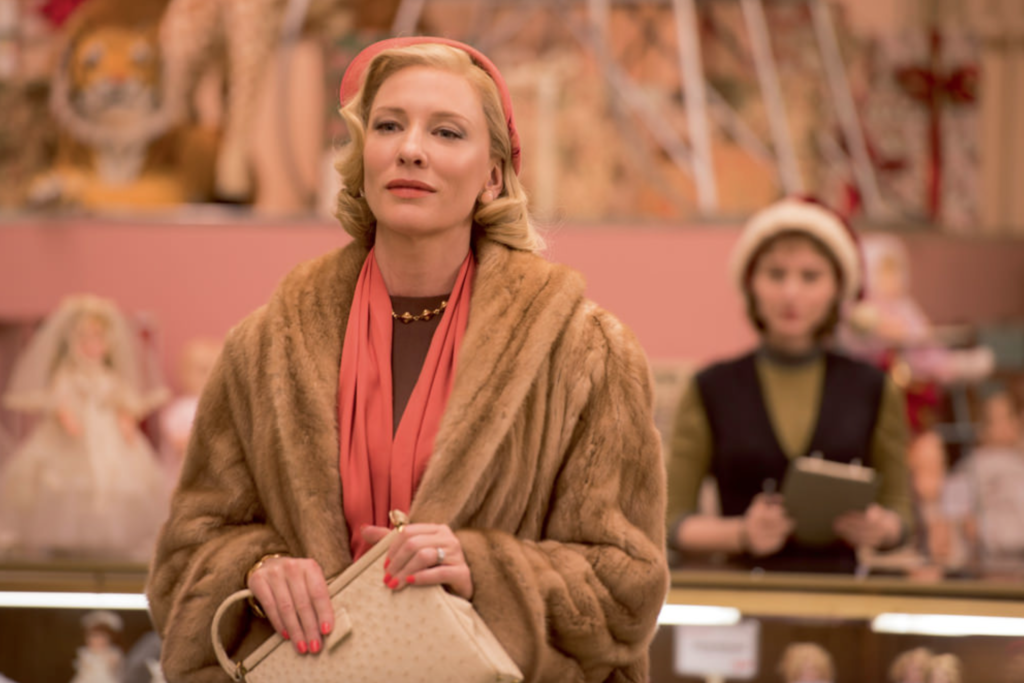A review of the 2015 film Carol, and the unexpected cultural impact it has on cinema.

They’re right there, emerging from the darkness, before the movie even has a chance to explain itself. Those big three letters: TWC.
I can’t help but notice the big TWC letters at the beginning of many recent films I’ve been catching up on. The (now disgraced) Weinstein Company’s influence was vast. It left behind a trove of high quality films. Some of those films will unfortunately by stained by this TWC mark. Particularly ones that end up having a certain type of bleak irony – forward-thinking passion projects that supposedly allowed true artists to express complicated and important issues – which end up being vehicles that a sick man used in order to ferry his personal demons.
Harvey Weinstein hid in plain sight by enshrining himself in progressivism, and even sometimes feminism. A twisted quid pro quo, where he “let” people make great films with great concepts, in return for favors (sexual or otherwise). Looking back on movies like Carol, you can’t help but think about what went into producing this film. What the actors and actresses and producers and writers and director might have had to do (as I mentioned, Harvey didn’t only deal in sex, he always held people’s careers in his hands, and often threatened to ruin them if they didn’t bend to his will). Did they have to contradict their core values in order to express the very values they hold so dear? And even the themes in a movie like Carol now seem suspicious. Even though the character of Carol is treated unfairly (and wrongly) for who she is (a gay woman), her ultimate misfortune still rests in at least partially self-inflicted fashion (marital infidelity). I can’t help but think how this film was shaped by Harvey. And that’s a shame.
Look, I don’t mean to bash Carol. It’s not a bad film. It’s a perfectly normal, average-to-good movie. But after contemplating the behind-the-scenes aspect of Pre-Harvey Scandal Hollywood, I can’t help but wonder things like, “Why was this movie made in the first place?” Or more darkly, “What rocks did Harvey get off by greenlighting and supporting this film?” It’s horrible that I even have to think that. But that goes to show how truly grotesque and devastating this whole scandal is. Because it’s not just for Harvey movies. He’s the biggest, easiest target. There’s a whole host of films made by powerful men under auspicious circumstances. And it’s been happening since the beginning of the industry. Since the beginning of civilization, if you want to broaden this to its more elemental, cultural level.
Obviously, the writers and artists involved in making Carol, and films like it, would have deeply personal reasons for why the movie was made – and valid ones. But in Hollywood, there’s only one thing that ultimately produces movies: Money. And Harvey had a lot of it, along with the considerable power that money carried with it. Carol was nominated for 6 Academy Awards, and it now has the classic look of a Weinstein art film that he used as a vehicle for accolades and, ultimately, more control and influence in his industry – and more control over people less powerful than he.
How do we evaluate this film’s merits without attaching it to the apparatus that it was/is a part of? Indeed, how do we evaluate ANY film going forward? By learning from our mistakes, I suppose? That’s a cheap, lifeless answer. But maybe the only one that will do right now.
Carol is a fine movie, with great performances by Cate Blanchett and Rooney Mara. Would this movie have been made if not for Harvey Weinstein (and all that he entails)? I don’t know. Perhaps not. Should it have been made? Yes, I think so. That’s the contradiction here, with both Harvey Weinstein and art in general. Art can be ugly, and reckless, and rooted in darkness. But by bringing it out of the darkness, hopefully we shed some light on what makes us who we are. What makes us people. And hopefully by exposing our stories to the world, we won’t need to hide our true selves in the dark. Maybe monsters wouldn’t be able to hide in the dark either.
3.5 out of 5 stars